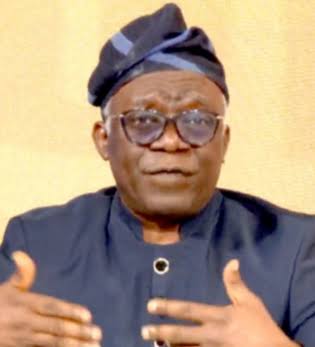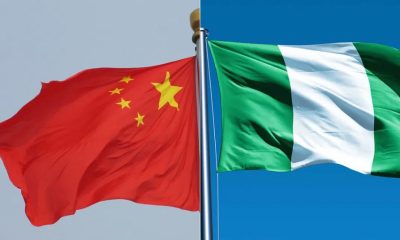News
ECOWAS Parliament Holds First Ordinary Session, As Speaker Ibrahima Seeks Support Against Food Insecurity, Terrorism, Poverty

News
Falana demands investigation into alleged diversion of $3.4bn IMF loan

By Kayode Sanni-Arewa
Human Rights lawyer, Femi Falana, SAN, has called on the Economic and Financial Crimes Commission (EFCC) and the Independent Corrupt Practices and Other Related Offences Commission (ICPC) to investigate the alleged criminal diversion of the $3.4 billion loan obtained from International Monetary Fund (IMF) by Nigeria to fight the Covid-19 pandemic.
He made the call in a statement he signed on behalf of the Alliance on Surviving Covid-19 and Beyond (ASCAB) on Sunday.
Falana also called on the IMF Board to probe alleged deliberate refusal of its Management to ensure that the emergency funds were “used for their intended purposes.”
He further urged the IMF to suspend the collection of the scheduled charges, including net charges, basic interest and administrative fees, amounting to SDR 125.99 million (N275.28 billion) pending the conclusion of its investigation.
Last week, the International Monetary Fund (IMF) confirmed that Nigeria had fully repaid the $3.4 billion COVID-19 financial support it got under the Rapid Financing Instrument (RFI).
Although Nigeria’s principal balance stands at zero, but scheduled charges, including net charges, basic interest and administrative fees, amount to SDR 125.99 million. At the current exchange rate, this translates to approximately N275.28 billion.
“It is pertinent to recall that in the wake of the COVID-19 in 2030, Nigeria requested emergency assistance of about US$3.4 billion—equivalent to 100 percent of its quota from the International Monetary Fund to shore up the country’s economy and help businesses weather the storm of a deadly pandemic that disrupted global markets and plunged the world into a recession.
“At the meeting of the IMF Executive Board held on April 28, 2020, the financial support of $3.4 billion was approved to provide critical support to shore up Nigeria’s heath care sector, and shield jobs and businesses from the shock of the COVID-19 crisis. In particular, the loan was designed to help alleviate the impact of the COVID-19 pandemic and the sharp fall in oil prices and also help limit the decline in international reserves.
News
EU leaders meet in Ukraine demand Russia’s unconditional 30-day ceasefire

In a significant diplomatic push on the ongoing Russia-Ukraine war, European leaders convened in Ukraine’s capital, Kyiv on Saturday, where they called out Russian President, Vladimir Putin, to agree to a 30-day unconditional ceasefire.
The European leaders threatened “massive sanctions” if Moscow fails to comply with their demand, according to Al Jazeera.
French President, Emmanuel Macron, German Chancellor, Friedrich Merz, and British Prime Minister, Keir Starmer, travelled together by train from Poland to Kyiv, later joined by the Polish Prime Minister, Donald Tusk.
The visit marked the first joint mission by leaders of these four European nations to Ukraine.
In a joint press conference with Ukrainian President, Volodymyr Zelenskyy, the leaders underscored their unified demand for an immediate halt to hostilities.
The proposed ceasefire, covering land, sea, and air operations, is seen as a critical step toward ending the three-year conflict.
Macron warned that the European bloc is prepared to escalate sanctions, specifically targeting Russia’s energy and banking sectors, should Putin refuse the proposal.
He also floated the idea of deploying foreign troops as a reassurance measure, saying, “The United States would take the lead in monitoring a proposed ceasefire, with support from European countries.”
Starmer delivered a sharp rebuke, stating, “Only one country started this illegal conflict, and that was Russia and Putin, and only one country stands in the way of resolving it peacefully, and that is Russia and Putin.”
Zelenskyy’s chief of staff, Andriy Yermak, highlighted the visit’s significance, saying, “There is a lot of work to do, a lot of topics to discuss.
“We must end this war with a just peace. We must force Moscow to agree to a ceasefire,” Al Jazeera reports.
Meanwhile, the Kremlin dismissed the European leaders’ demands, describing it as confrontational.
Russian spokesman Dmitry Peskov reportedly said, “We hear many contradictory statements from Europe.
“They are generally confrontational in nature rather than aimed at trying to revive our relations. Nothing more.”
The call for a ceasefire is also backed by U.S. President Donald Trump, who has proposed the 30-day halt as a foundation for peace negotiations.
However, Putin has so far resisted international pressure.
Ukraine’s Foreign Minister Andrii Sybiha reiterated Kyiv’s readiness, saying, “Our country and its allies are ready for a full, unconditional ceasefire with Russia for at least 30 days starting on Monday.”
The visit came a day after Putin struck a defiant tone during a military parade in Moscow commemorating the 80th anniversary of World War II victory, underscoring the entrenched tensions.
Al Jazeera’s Zein Basravi, reporting from Kyiv, noted that while the visit was “symbolic,” it also involved practical efforts to ensure U.S. engagement in future peace talks.
After the meetings, Ukraine’s Ministry of Foreign Affairs confirmed that the five leaders held a phone call with Trump to coordinate their peace strategy.
Sybiha emphasized on X, “If Russia agrees and effective monitoring is ensured, a durable ceasefire and confidence-building measures can pave the way to peace negotiations.”
The leaders issued a joint statement stressing their commitment, saying, “Alongside the US, we call on Russia to agree [to] a full and unconditional 30-day ceasefire to create the space for talks on a just and lasting peace.
“We are ready to support peace talks as soon as possible, to discuss technical implementation of the ceasefire, and prepare for a full peace deal.”
They noted, “The bloodshed must end, Russia must stop its illegal invasion, and Ukraine must be able to prosper as a safe, secure and sovereign nation within its internationally recognised borders for generations to come.”
News
NDLEA nabs Iran-bound woman with cocaine in private part, stomach, bag at PH airport(Photos)

. ..arrests 22-year-old British ex-convict with large drug shipment at MMIA; intercepts fuel tanker, 3 vehicles with 3, 047kg skunk in Niger, 775 litres of codeine in Kano
Desperate attempt by a woman, Ihensekhien Miracle Obehi who disguised with hijab to export large consignments of cocaine concealed in her private part, stomach and false bottom of her handbag to Iran has been thwarted by operatives of the National Drug Law Enforcement Agency (NDLEA) at the Port Harcourt International Airport, Port Harcourt, Rivers state.
Obehi who was dressed in hijab to beat security checks was intercepted at the departure hall of the Port Harcourt airport on Sunday 3rd May 2025 while trying to board a Qatar Airline flight to Iran via Doha following credible intelligence. During her search, she was found to have inserted three wraps of cocaine in her private part, and two large parcels hidden in false compartments of her handbag while she swallowed 67 pellets of the Class A drug.
As a result, she was placed under excretion observation and after four excretions that lasted days, she expelled the 67 wraps of the substance in her stomach. She claimed she was to swallow 70 pellets of cocaine but after ingesting 67 pieces she could no longer swallow the remaining three and decided to insert them into her private part. The total weight of the three consignments hidden in different parts of her body comes to 2.523 kilograms.
In like manner, NDLEA operatives at the Murtala Mohammed International Airport, MMIA, Ikeja Lagos on Friday 9th May intercepted a 22-year-old British national, Campell Kaizra Kofi Johannes Slifer coming from Thailand through Doha on Qatar Airways flight with two suitcases loaded with 35 parcels of Loud, a strong strain of cannabis weighing 37.60kg.
Campell who claimed he had twice been convicted in the UK for drug trafficking and robbery, said he was recruited in London to travel to Thailand to pick the illicit consignment and bring same to Nigeria.
In Niger state, NDLEA officers acting on intelligence on Wednesday 7th May intercepted a fuel truck marked ABJ 693 XU and three other vehicles loaded with 246 bags of skunk, a strain of cannabis with a combined weight of 3, 047 kilograms along Suleja-Kaduna road. Four suspects arrested with the exhibits include: Christopher Onyema, 47; Benedict Etineruba Young, 54; Chukwudi Ujue Jerry, 30; and Mohammed Abdullahi Danasabe. Apart from the fuel truck, three other vehicles recovered from the suspects include: Honda Odyssey bus marked YAB 667 CZ; Gulf bus with registration number GWA 125 TQ and
Honda Odyssey bus marked ABJ 230 CN.
At Oja Amukoko in Ijora area of Lagos, two suspects: Eze Chekube Emmanuel and Ike Samuel Chinyerem were on Thursday 8th May arrested by NDLEA operatives with a total of 109,914 pills of tramadol, swinol and nitrozepam seized from them.
While 52.5kg skunk was recovered from two suspects: Lukman Sabo Umar, 23, and Tukur Ammadu, 20, in a bus at Gwantu, Sanga LGA, Kaduna State on Tuesday 6th May, NDLEA operatives on patrol along Bode Saadu- Jebba expressway, Kwara State on Monday 5th May
arrested Rufai Nasiru with 45,400 pills of tramadol 225mg.
In Bauchi state, NDLEA officers on patrol along Bauchi-Gombe road on Tuesday 6th May intercepted a Toyota Tundra jeep marked RBC 111 DW conveying 526 blocks of skunk weighing 505kg with two suspects: Isaac Onogure, 37 and Ikechukwu Peter, 44, arrested.
A total of 31 kegs containing 775 litres of codeine syrup were recovered from two suspects:
Hafizu Isa Uman, 34, and Ismail Shehu, 48, when NDLEA operatives raided their hideout at Rijiyar Zaki area of Kano on Saturday 10th May, while 1.1kg of Loud consignment concealed in pillow coming from Thailand was on Tuesday 6th May intercepted by NDLEA officers at a courier company in Lagos.
The War Against Drug Abuse, WADA, social advocacy activities by NDLEA Commands equally continued across the country in the past week. Some of them include: WADA sensitization lecture delivered to students and staff of Federal Government College, Sokoto; Deeper Life International College, Nteje, Anambra; Martins Sanda Girls Science College, Paikoro, Niger state; Restoration Power International School, Idua Eket, Akwa Ibom; while Oyo state command delivered WADA enlightenment lecture to members of the League of Imams and Alfas at Iseyin Central Mosque, Iseyin, among others.
While commending the officers and men of DOGI, MMIA, PHIA, Lagos, Kano, Kaduna, Bauchi, Kwara, and Niger Commands of the Agency for the arrests and seizures of the past week, Chairman/Chief Executive Officer of NDLEA, Brig. Gen. Mohamed Buba Marwa (Rtd) equally praised their counterparts in all the commands across the country for pursuing a fair balance between their drug supply reduction and drug demand reduction efforts.
-

 News21 hours ago
News21 hours agoTrouble brewing as Trump’s supporters move against Pope Leo, give reason
-

 News24 hours ago
News24 hours agoNaira Rebounces Against Dollar – Saturday, May 10, 2025
-

 News11 hours ago
News11 hours agoNatasha’s TikTok vibe to Tinubu’s song raises concerns about potential defections
-

 News22 hours ago
News22 hours agoChina Responds to AFN Claims Over Visa Delays for World Relays in Guangzhou
-

 Entertainment11 hours ago
Entertainment11 hours agoFemi Adebayo wins 2025 AMVCA ‘Best Lead Actor Award
-

 News21 hours ago
News21 hours agoDigital Shift in National Assembly No Longer Optional – CNA Ogunlana
-

 Entertainment11 hours ago
Entertainment11 hours agoAMVCA 2025: Iyo Prosper outshines Taaooma, Brain Jotter in winning Content Creator award
-

 News22 hours ago
News22 hours agoReflections of Hon. EJ Agbonayima on Nation Building










